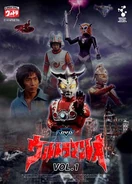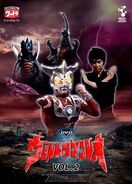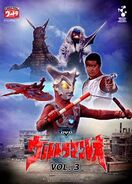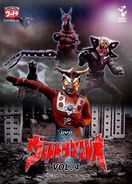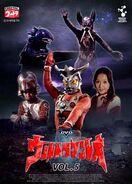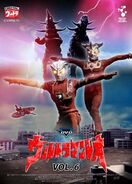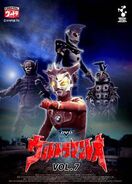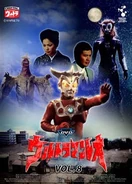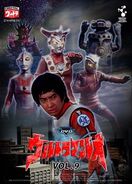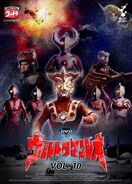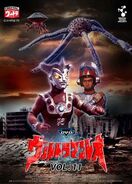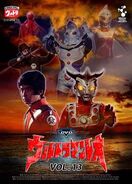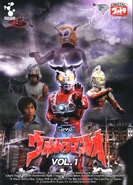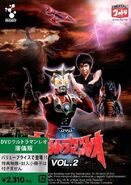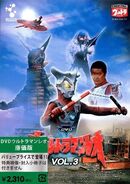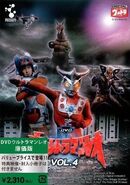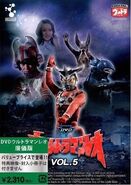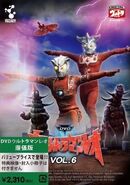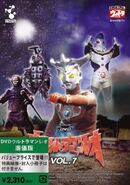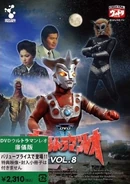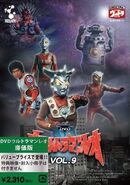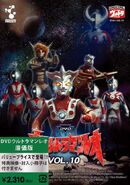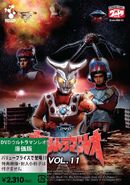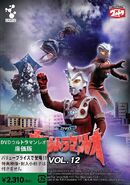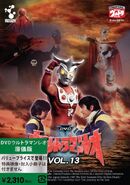Ultraman Leo is the seventh entry in the Ultraman Series, airing from 1974 to 1975. It had a much darker theme than the preceding Ultraman Taro.
This series can be watched on Shout TV, Tubi, Pluto, and Roku.
Production[]

The first promotional poster of Ultraman Leo.
In 1973, after the broadcast of Ultraman Taro, the show became widely popular due to its high ratings. Around October 1973, Tsuburaya Productions began planning the next project, appointing Ken Kumagai and Akira Tsuburaya as producers, and commenced the preparation period for the new series.
However, during the same time, the outbreak of the Yom Kippur War led to the "1973 Oil Crisis," with OPEC member countries increasing oil prices by more than double from 1974 onwards. As a result, Japan's prices surged by 23% in a short period, prompting Tsuburaya Productions to start controlling the budget during the later stages of Ultraman Taro, using pyrotechnic effects and optical synthesis to reduce production costs. The planning for the successor to Ultraman Taro was largely completed by January 1974.[1]
The meeting at that time included Ken Kumagai, Akira Tsuburaya, Shigemitsu Taguchi, and TBS film department representatives Yoji Hashimoto and Kunio Kumagai. Initially, due to rising prices and increasing costs for monster designs, a project aimed at cost reduction was formulated. Consequently, the draft proposal for the TV Movie Project Plan Ultra Series 7th! Ultraman L (Tentative Title) was officially presented. The key points of this proposal included: "Ultraman Leo is a mysterious alien who teams up with the patrol team captain responsible for protecting Earth. Together, they fight to the end to protect the Earth from cosmic invaders."[1]
The subsequent proposal criticized the recent depiction of hero characters as being too close to humans and overly good-natured, arguing that such superheroes should not become an escape for children. Only when superheroes possess mystique and deification can they truly become superheroes. This series aims to restore the hero's mystique by creating a new solitary hero—a superhero who carves his own path. Compared to its predecessor Ultraman Taro, the content is much more serious. To enhance the series, the proposal explicitly states the need to explore "the harsh conflicts between humans," and the cover of the scripts for the episodes highlights "vividly singing the harshness and sadness of survival." The protagonist will be forced into difficult situations and painful struggles amidst friction with strong enemies and surrounding people, gradually growing into a hero.[1]

The initial design for Ultraman Leo was completed by art director Yoshio Suzuki. The original design included silver lines, but after several modifications, the final decision was made to refine the body, resulting in the current appearance.[2][3]
The story proposed in the plan describes how a young man, Leo Otori (Ultraman Leo), confronts monsters on the sunken Bird Island and his encounter with the captain of the JAC, Tetsutaro Kawakami . Kawakami will act as Leo's mentor, training him, while Leo's basic setting as a sports instructor is established. The differences from the actual production include Kawakami being a married man with a daughter named Kaori, and the existence of the Planet M77 and the Ultra Sports Club.[1]
To reduce costs, the series shifted its focus from special effects to action scenes, minimizing the special effects and light techniques for Ultraman Leo and the monsters. Consequently, it became necessary to strengthen the plot, emphasizing action and developing the training and mentor-student relationship, forming a storyline with a sports spirit. To highlight this, the main characters were concentrated on Leo and Kawakami, while the other Space Patrol members were deliberately downplayed, a point that was made clear during the planning stage. Additionally, the planning document recorded a major premise for Leo's setting that was not adopted: Leo's home planet, M77, was continuously invaded by monsters and aliens, and Leo's father remained on the planet. Although this background increased Leo's tragic nature, it made the setting too complex and was thus not adopted in the actual production.[4]
Shortly after this project proposal was submitted, another titled Ultraman Leo was created. This proposal was slightly more organized, but there was no significant difference in content. According to Taguchi, it was anticipated at this planning stage that this work would not surpass the ratings of Ultraman Taro, so it was decided from the start to give the Ultraman series at that time a "phased conclusion." As for the casting of the lead role, the decision was ultimately made to have a newcomer, Ryu Manatsu, who held a first-degree black belt in Shorinji Kempo and a second-degree black belt in Kendo, take on the role.
When the script for the first episode was completed, the biggest change was transforming the character of Space Patrol Captain Tetsutaro Kawakami into Dan Moroboshi. This alteration occurred because Kohji Moritsugu was cast for the role of Kawakami. Although Tsuburaya Productions had no issue with Moritsugu playing Kawakami, Moritsugu himself was concerned about the audience's reaction to him playing a character other than Dan. Therefore, he expressed his desire to appear as Dan. Consequently, the first episode featured a dramatic plot where Ultraseven appears and, after being injured, withdraws from the front lines. This change allowed for the depiction of a role transition between Ultraman Leo and Ultraseven.[4][5]

The promotional newspaper for "Ultraman Leo" introduced in the evening edition of the Shizuoka Shimbun in February 1974.[6]
At the same time, the main plot of the series was heavily influenced by the popular trends of kung fu movies and disaster films in Japan at the time, including Enter the Dragon and Japan Sinks. The series was originally scheduled to air on April 5, 1974, but due to an extension of Ultraman Taro, the start date was pushed back to April 12 of the same year. There are two explanations for this delay: one is that the production of Ultraman Leo was delayed, leading to an additional episode of Ultramn Taro; the other is that the delay was intended to avoid competition with other tokusatsu hero programs airing in April.
Although the first episode achieved a rating of over 20%, subsequent ratings began to decline. This was because the audience for the Ultraman series was younger than the production team had anticipated. The serious human drama in the first 16 episodes was not easily accepted by this younger audience. In June, to address the extension of the third season, the production team compiled a "Memo on Strengthening the Program Extension," proposing to reduce Dan's training scenes. However, in the episode 17, where this plan was implemented, the ratings dropped below 10%. During this period, the MAC team members underwent significant reorganization.[4]
Despite the poor performance of the five episodes under the strengthening plan, the ratings improved after the introduction of a monster created from a design competition. To boost the third season's ratings, the production team proposed the "Japan Masterpiece Folklore Series" project, incorporating stories with a comedic style similar to Ultraman Taro. This included the reappearance of actors who had previously participated in the series, but this only achieved some success in certain episodes.

The article titled "Goodbye, Ultraman Leo" was published in the April 1975 issue of "Shōgaku Ichinensei."[7]
There was even consideration to terminate the show at one point, but it was ultimately decided to produce a fourth season. At this time, Tsuburaya Productions decided to annihilate the MAC, implementing a bold change in direction as a cost-saving measure. Two plans were proposed: one involved the Ultra family boarding a large battle saucer, causing Earth to be involved in the Land of Light's space war, depicting mechanical battles against alien and monster armies. The other plan involved Leo showcasing overwhelming strength as a solitary hero without any allies.[4]

The article titled "Goodbye, Ultraman," published on March 13, 1975, by the Mainichi Shimbun, reported on the conclusion of this work and the end of the second Showa Ultraman series.[8][9]
After deliberation, it was decided to pursue the latter, more serious direction starting from episode 40. By annihilating the MAC to retire Dan and killing off all the main characters from the sports center except for Toru Umeda, the focus shifted to depicting the growth, youth, and battles of Gen, thereby increasing Toru's importance in the series. After completing all episodes amidst various intense changes, the series entered a dormant period, marking the end of the Showa era's second series.[4]
Synopsis[]
The Alien Magma, who had destroyed numerous planets, attacked Earth with twin Kaiju. Dan Moroboshi, the captain of the Space Patrol Team MAC and also known as Ultraseven, confronted them.
However, he found himself in a dire situation due to the terrifying power of the monsters. In Ultraseven's moment of crisis, a new hero resembling a lion emerged – Ultraman Leo. He was a survivor from the planet L77 of the Leo constellation, which had been destroyed by the Alien Magma.
Characters[]
Protagonist[]
MAC[]
- Dan Moroboshi
- Akio Kuroda
- Ichiro Aoshima
- Kiyohiko Akashi
- Haruko Momoi
- Junko Shirakawa
- Atsushi Hirayama
- Daisuke Sato
- Jun Shirato
- Ippei Kajita
- Haruko Matsuki
- Suzuki
- Saburo Sato
- Yoji Kitayama
Jonan Sports Center[]
Miyama Family[]
Ultras[]
- Ultraman Leo
- Ultraman King
- Astra
- Ultraseven
- Ultraman
- Zoffy
- Ultraman Jack
- Ultraman Ace
- Mother of Ultra
- Father of Ultra
Kaiju[]
- Giras Brothers
- Alien Magma
- Alien Tsuruk
- Kanedoras
- Alien Karly
- Kendoros
- Vekira
- Guiro
- Ron
- Alien Kettle
- Bango
- Alien Vibe
- Antales
- Alien Flip
- Alien Atler
- Alien Wolf
- Batton
- Alien Boze
- Bock
- Dogyuh
- Alien Alpha
- Northsatan
- Garon and Littre
- Alien Coro
- Renbolar
- Carolyn
- Alien Sarin
- Gamerot
- Alien Clean
- Satan Beetle
- Pressure
- Planet Apple Chicken
- Oni-on
- Alien Paradai
- King Paradai
- Uringa
- Alien Magma II
- Rolan
- White Flower Spirit
- Alien Virmin
- Princess Kaguya
- Kirara
- Alien Akumania
- Sevenger
- Ashuran
- Taishoh
- Alien Atlanta
- Alien Mazaras
- Specter
- Alien Babarue
- Black Directive
- Silverbloome
- Black Dome
- Absorba
- Demos
- Black Garon
- Mayuko
- Blizzard
- Hungler
- Black Terrina
- Satan Mora
- Nova
- Alien Bunyo
- Black End
Cast[]
- Ultraman Leo/Gen Otori : Ryu Manatsu
- Dan Moroboshi : Kohji Moritsugu
- Seiji Omura : Yu Fujiki
- Momoko Yamaguchi : Kaori Okano
- Toru Umeda : Tsunehiro Arai
- Kaoru Umeda : Yoshiko Tominaga
- Takeshi Nomura : Yukio Ito
- Sakiko Miyama : Masumi Harukawa
- Izumi Miyama : Fujiko Nara
- Ayumi Miyama : Kaoru Sugita
- Akio Kuroda : So Kuroda
- Ichiro Aoshima : Yuichi Yanagisawa
- Kiyohiko Akashi : Kenji Oshima
- Junko Shirakawa : Mieko Mita
- Haruko Momoi : Kyoko Aradama
- Atsushi Hirayama : Nobuo Hirasawa
- Daisuke Sato : Shigeo Tezuka
- Jun Shirato : Masaharu Matsusaka
- Ippei Kajita : Takashi Asakura
- Haruko Matsuki : Tomoko Ai
- Miyako Otsuki : Midori Ohara
- Commander Tatakura : Takashi Kanda
- Black Directive : Takeshi Obayashi
Voice Actors[]
- Astra : Jun Maruyama
- Ultraman King : Motomu Kiyokawa & Hiroshi Masuoka
- Zoffy : Satohiro Sakai
- Ultraman : Shinya Nazuka
- Returning Ultraman : Takashi Takeuchi
- Ultraman Ace : Shingo Toyokawa
- Ultraseven : Kenji Nakagawa
Suit Actors[]
- Ultraman Leo :
- Tatsumi Nikamoto
- Kazunori Kawaguchi
- Astra : Mamoru Kusumi
- Ultraman King : Toshiya Oaku
Staff[]
- Producer: Ken Tsuburaya, Takeshi Kumagai, Yoji Hashimoto (TBS), Kunio Kumagai Kunio (TBS Movie Division)
- Screenplay: Shigemitsu Taguchi, Ai bun bin, Tetsuro Domon, Bunzo Wakatsuki, Okutsu Akirajiro, Ishido Yoshiakira
- Director: Tadashi Mabune, Kiyosumi Fukasawa, Shohei Tojo, Toru Toyama, Masanori Kakei, Isao Maeda, Tadashitakashi Yamamoto, Junkichi Oki, Nobuo Nakagawa, Tadashi Okamura, Hisashisan Yamagiwa
- Special effects director: Koichi Takano, Nobuo Yajima, Shohei Tojo, Junkichi Oki, Yoshiyuki Yoshimura
- Music: Toru Fuyuki
- Shooting (Main): Kiyoshi Suzuki, Goro Uchiyama
- Shooting (Special Effects): Kimikatsu Kunihiko
Music[]
- Opening Themes
- Ultraman Leo (episodes 1 - 13)
- Lyrics: Yu Aku
- Composition & Arrangement: Makoto Kawaguchi
- Artist(s): Ryu Manatsu, Lake Boys and Girls Choir (Tokyo records)
- Tatakae! Ultraman Leo (episodes 14 - 51)
- Lyrics: Yu Aku
- Composition & Arrangement: Kawaguchi Makoto
- Artist(s): Yuki Hide (credited as Hideyuki), Lake Boys and Girls Choir (Tokyo records)
US Television Premiere[]
- Honolulu, Hawaii-based on-air broadcaster of Japanese programming, KIKU-TV, the home of the tokusatsu or Kikaida craze of the 1970s, began airing all 51 episodes of the series on Friday, January 3, 2014 at 6:30 PM (Hawaiian Standard Time) in Japanese with English Subtitles.[10] In 1975, an English-dubbed version of Ultraseven was broadcast on Honolulu's NBC affiliate KHON-TV.
- The series is available for streaming on Crunchyroll, VRV, and Shout! Factory TV.
- TOKU premiered the series with English subtitles in the United States on November 29, 2017.
Home Media[]
Complete DVD Set[]
2006 release[]
2011 release[]
Gallery[]
Images[]
Videos[]
Trivia[]
- Ultraman Leo got off on a bad start. The previous series (Ultraman Taro) was extended from 49 to 53 episodes because pre-production of Leo was running behind schedule.
- The MAC song sings about the MAC Mole and the MAC Shark, but these machines were never used in battle on the series. However the MAC Shark makes an appearance in the opening credits after episode 28.
- Ultraman Leo's first theme was chosen as Tatakae! Ultraman Leo was not ready at that time.
- The demo singer of Tatakae! Ultraman Leo was actually Masato Shimon as a note to Yuki Hide on how to sing it.
- The series used new special effects for the Ultraman Series. They were mostly reused from Jumborg Ace.
- The Ultra Brothers make fewer appearances than they did in the previous two series and Taro is not even mentioned or acknowledged at all in this series.
- Ultraman Leo marks one of the few times Kamen Rider airs on the shows' same network (TBS) at all. The Kamen Rider show Kamen Rider Stronger aired on TBS a week after Ultraman Leo concluded.
External Links[]
- Ultraman Leo at Tsuburaya Productions' official website
- Ultraman Leo at Wikipedia
- Ultraman Leo at Japanese Wikipedia
References[]
- ↑ 1.0 1.1 1.2 1.3 Ultra Tokusatsu PERFECT MOOK vol. 9: Ultraman Leo, pg 4
- ↑ https://x.com/sandae2356/status/1688305022461952000
- ↑ https://qqquuu7.web.fc2.com/reong3.html
- ↑ 4.0 4.1 4.2 4.3 4.4 Ultra Tokusatsu PERFECT MOOK vol. 9: Ultraman Leo, pg 5
- ↑ https://qqquuu7.web.fc2.com/reong25.html
- ↑ https://x.com/sou_yamasina/status/1134812224629792769
- ↑ https://x.com/matuhiromatuhi/status/846704450936856576
- ↑ https://x.com/Tetsuya_Kuroki/status/576337262650134529/
- ↑ https://x.com/self_keton/status/1778925261431726115
- ↑ http://kikutv.com/


